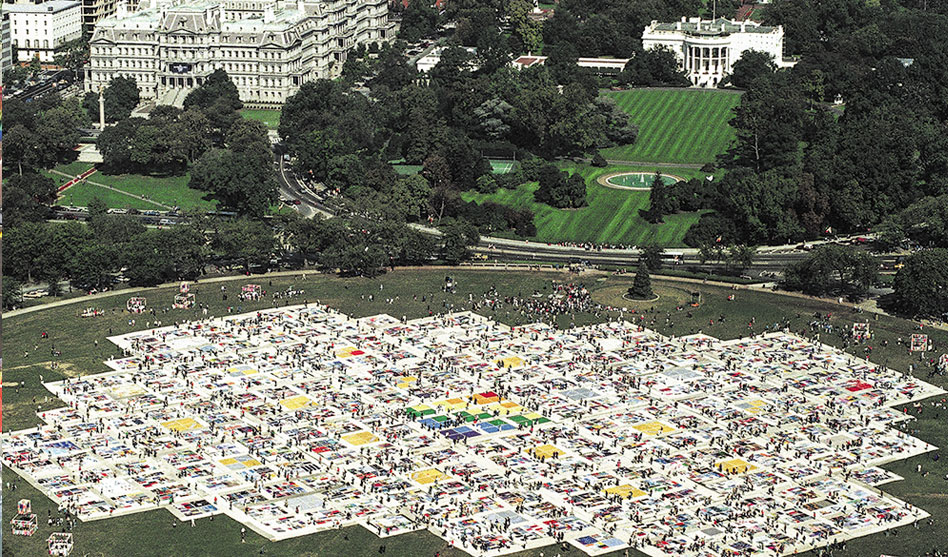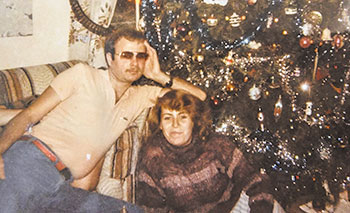Debbie-Messer-and-her-brother-Randy
When she visits the AIDS Memorial Quilt exhibit during Dallas Pride this weekend, Debbie Messer will see the panel honoring her brother for the first time
MELISSA WHITLER | Intern
editor@dallasvoice.com
Thirty-six years after it was first displayed at the National Mall in Washinton, D.C., nine panels of the AIDS Memorial Quilt are coming to Dallas to be displayed in Fair Park during Dallas Pride this weekend. Among the nine is one made for Randy Foster Moore, and it is especially significant — this is the very first time his sister, Debbie Allen Messer, will see the Quilt panel commemorating her brother.
Messer, a retired firefighter who came up from Austin to see the exhibit, took a few minutes to share her brother’s story with Dallas Voice and our readers.
While the Quilt itself is a beautiful piece of art, more importantly, it serves as a memorial to thousands of lives that have been lost to HIV/AIDS.
The project was started by activist Cleve Jones in 1985 after the candlelit march in memorial of Harvey Milk and George Moscone. After hanging up the written names of loved ones lost to AIDS, Jones was struck by the idea that the display looked like a patchwork quilt.
In October 1987, Jones’ inspiration came to life when the NAMES Project officially displayed the quilt for the first time.
 Because of the social stigma attached to AIDS, many of those who died from AIDS-related causes did not have funerals and were not properly honored by their families. Adding a panel created in their memory to the Quilt was a way to rectify that and remember loved ones lost to this tragic disease.
Because of the social stigma attached to AIDS, many of those who died from AIDS-related causes did not have funerals and were not properly honored by their families. Adding a panel created in their memory to the Quilt was a way to rectify that and remember loved ones lost to this tragic disease.
Messer understands the significance of these Quilt panel memorials; her brother died from AIDS back in the 1980s when the stigma was at its height. She was a senior in high school when Randy was diagnosed and only 21 when he passed.
Messer remembers vividly just how devastating his death was, since Randy, who was 15 years older, was her father figure growing up.
She recalls summers when they would ride bikes together and go to the beach and arcade. He was the one that got her hooked-on pinball, and took her on her first trip to Disneyland when she was 8. For her 13th birthday, they spent the day at Magic Mountain riding rollercoasters together. He was there for her when no one else was. She said he served in the Navy for about six years, but was eventually forced to retire because of his sexuality.
Her biggest regret, Messer said, is that Randy didn’t get the chance to watch her grow up and meet her kids.
He was first diagnosed in 1984, and at that time an AIDS diagnosis was essentially a death sentence. It was not until 1985 that Randy called his sister and her mom over to his and his partner’s apartment to tell them he was sick.
Messer said she hadn’t even known her brother was gay until that conversation.
After getting the news, Messer left high school to take care of Randy. At the time, she was also pregnant with her first child, a daughter who would be named Randy after Messer’s brother.
Even though Messer was not sick herself and identified as straight, she experienced firsthand the stigma and discrimination associated with AIDS. Her manager at work started to avoid her and refused to speak to her in person because of her brother. She said she remembers just feeling despondent and angry, as the time was filled with so much loss.
Almost all of Randy’s friends died during the AIDS epidemic. At the time there were no treatments for AIDS, and not enough assistance was being offered by the government or the medical community. Messer said she mourned the entire time her brother was dying, watching as his health slowly declined.
It was hard to see him so scared and crying, especially since she was so young.
For the majority of the time he was sick, Randy stayed at a friend’s house. But near the end of his life, he was moved into AIDS-specific hospice care. He eventually died from meningitis on Aug. 5, 1987, just shy of his 34th birthday.
After his death, a group of Randy’s friends got together and created a Quilt panel as a memorial to him. It was included in the inaugural Quilt display and is identified as #0061. While Messer has seen pictures of the Quilt, she has never been able to see it in person, which is why this weekend is so important to her.
It was not until a couple weeks ago, she said, that she found out some panels of the Quilt were going to be displayed at Dallas Pride. When she found out, she quickly emailed the NAMES Project to find out if panel #0061 could be included.
And now, almost 36 years after his death, Debbie Messer will finally see Randy’s memorial panel in person. She says it feels like going to his gravesite, and she is a bit worried the experience will be too overwhelming.
This will be her first Pride festival, too, and she said it feels like she’s going to see a part of her brother she never knew.
















Debbie, I’m so sorry for the loss of Randy, however I’m so thankful you were given the opportunity to get to Dallas and see his panel.